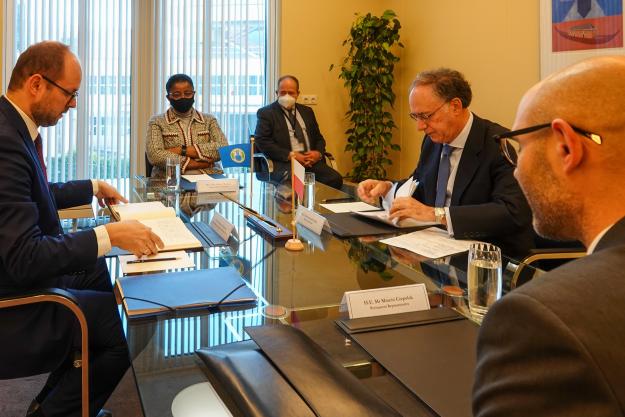The Director-General of the Organisation for the Prohibition of Chemical Weapons (OPCW), H.E. Mr Fernando Arias met today with the Deputy Minister of Foreign Affairs of Poland, H.E. Minister Marcin Przydacz, at OPCW Headquarters in The Hague.
The Deputy Foreign Minister and the Director-General discussed an array of issues related to the implementation of the Chemical Weapons Convention, highlighting efforts to address the threat from chemical weapons use and promote the application of chemistry solely for peaceful and authorised purposes. The Director-General briefed H.E. Mr Przydacz on the ongoing construction of the ChemTech Centre - an important upgrade to the OPCW's facilities that will help the Organisation fulfil its mandate and further support Member States in implementing the Chemical Weapons Convention.
The Deputy Foreign Minister remarked: "Poland highly values the OPCW for its leading role in promoting full implementation of the Chemical Weapons Convention. We have full confidence in the professionalism, objectivity, impartiality, and independence of the Technical Secretariat. I am sure that the new ChemTech Center will further increase capabilities of the Organisation. Regrettably, despite all efforts to eradicate chemical weapons completely a lot of challenges remain, including the threat posed by the chemical weapons dumped in the Baltic Sea."
Director-General Arias stated: "I am grateful for Poland's continued efforts to strengthen adherence to the norms enshrined in the Chemical Weapons Convention. In addition to a series of Polish initiatives at the OPCW, I also welcome the recent UN resolution tabled by Poland that condemns the use of chemical weapons. Today's discussion identified a range of further activities towards advancing the OPCW's mission to rid the world of chemical weapons."

Background
Poland has been an active member of the OPCW since 1997. Poland is currently a member of the Executive Council, the OPCW's executive organ, which is charged with promoting the effective implementation of and compliance with the Chemical Weapons Convention as well as supervising the activities of the Organisation's Technical Secretariat.
As the implementing body for the Chemical Weapons Convention, the OPCW, with its 193 Member States, oversees the global endeavour to permanently eliminate chemical weapons. Since the Convention's entry into force in 1997, it is the most successful disarmament treaty eliminating an entire class of weapons of mass destruction.
Over 98% of all declared chemical weapon stockpiles have been destroyed under OPCW verification. For its extensive efforts in eliminating chemical weapons, the OPCW received the 2013 Nobel Peace Prize.






